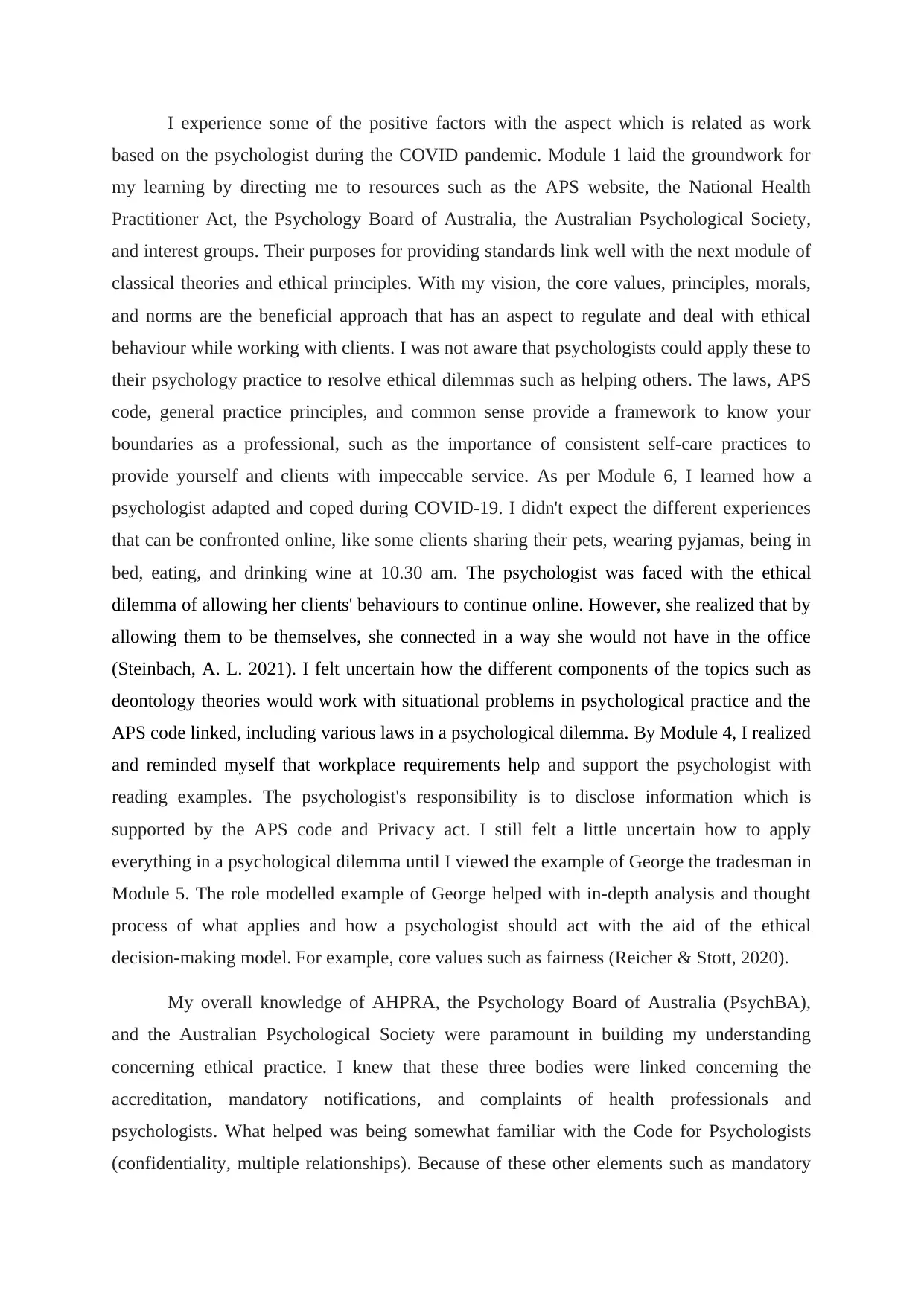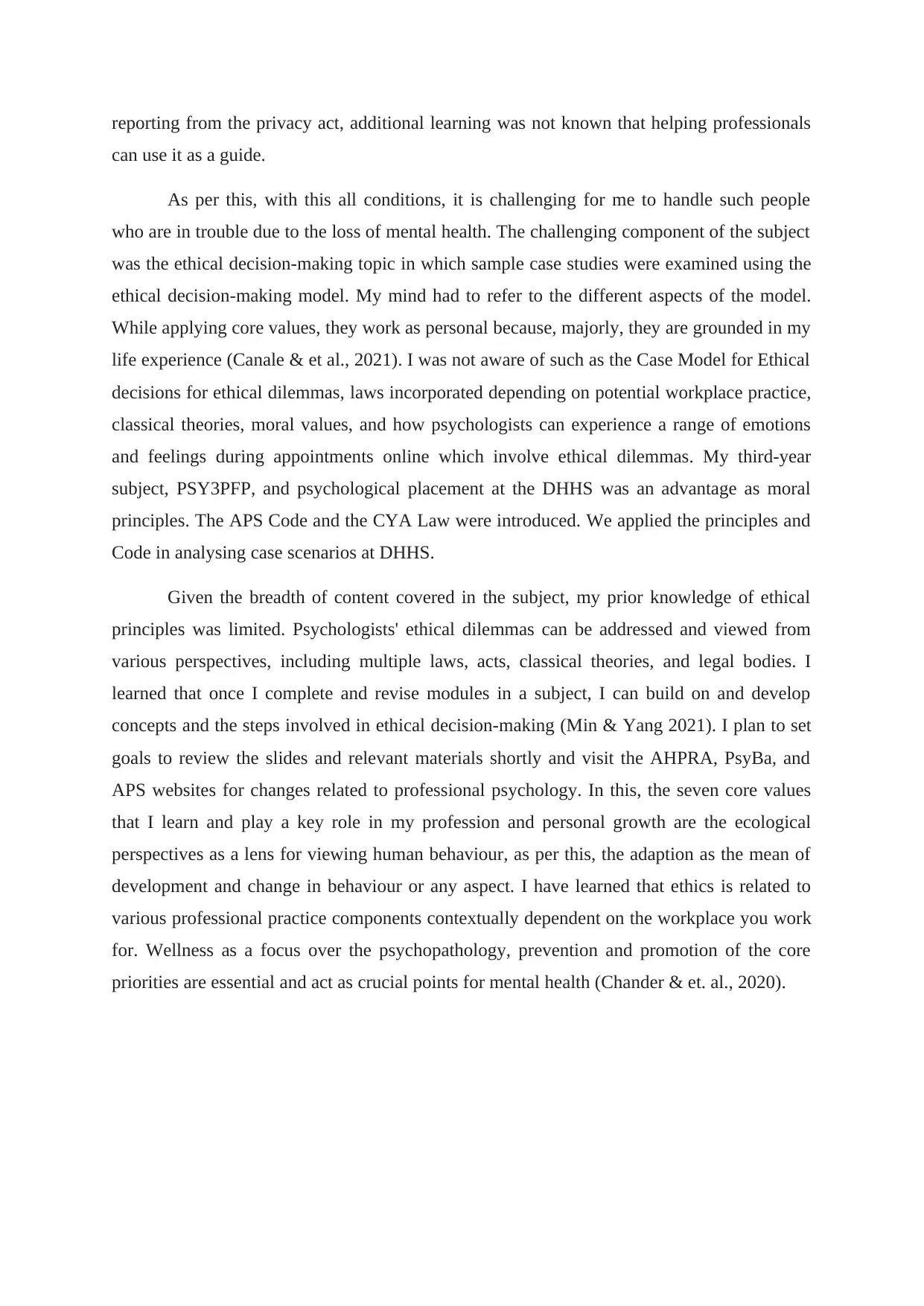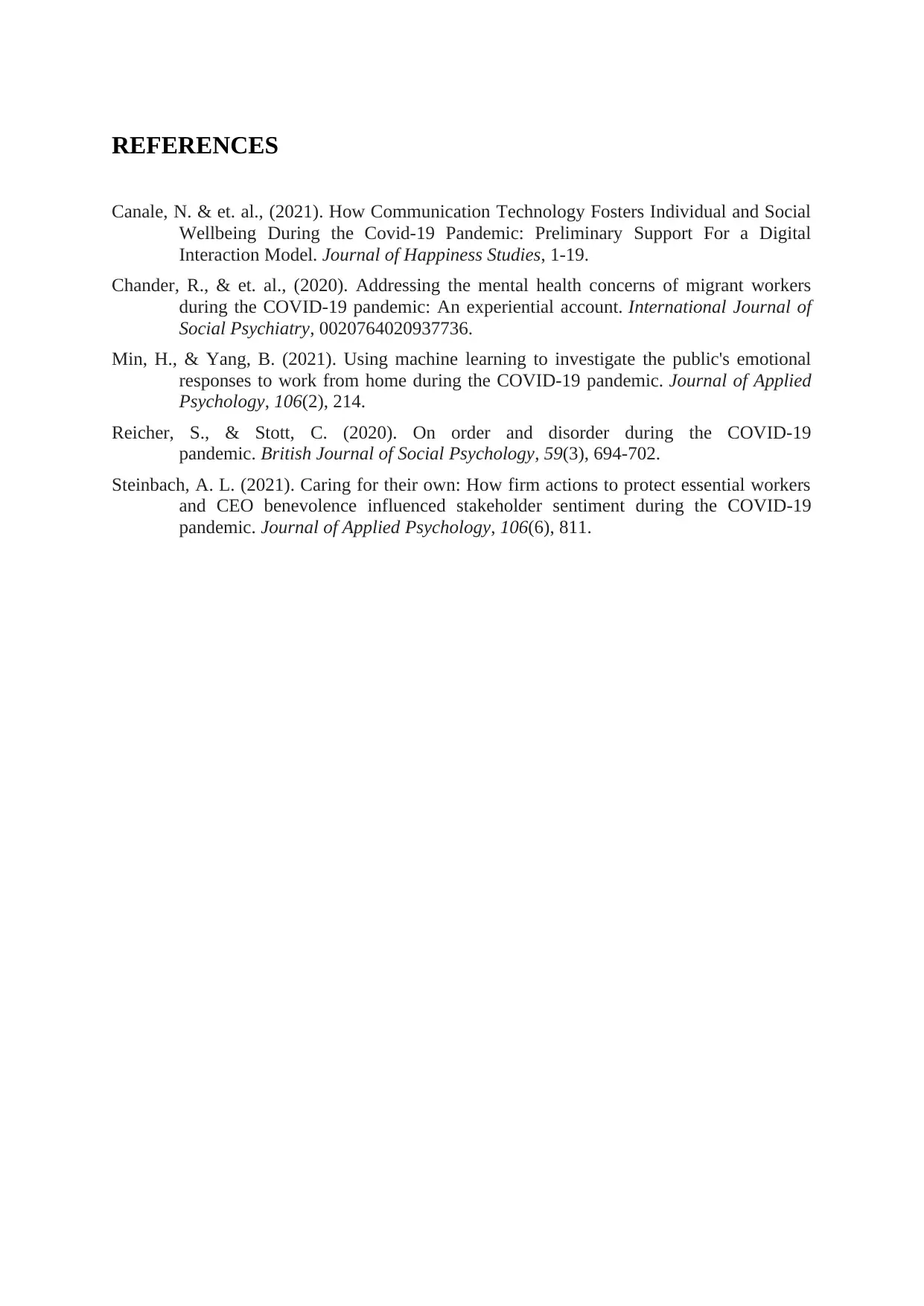Personal Reflections on Ethical Practice in Psychology During COVID-19
VerifiedAdded on 2023/06/18
|3
|1136
|79
Journal and Reflective Writing
AI Summary
This journal entry reflects on the author's learning experiences regarding ethical practice in psychology, particularly during the COVID-19 pandemic. The author explores various resources, including the APS website, ethical principles, and legal frameworks, to understand how psychologists navigate ethical dilemmas. Key topics covered include the importance of self-care, adapting to online therapy, and applying ethical decision-making models in complex scenarios. The author also discusses the roles of AHPRA, the Psychology Board of Australia, and the Australian Psychological Society in maintaining ethical standards. The reflection highlights the challenges of applying theoretical knowledge to real-world cases and the emotional impact on psychologists. The author emphasizes the importance of ongoing learning and references specific modules and case studies that enhanced their understanding of ethical practice, ultimately aiming to integrate these insights into their professional development.

I experience some of the positive factors with the aspect which is related as work
based on the psychologist during the COVID pandemic. Module 1 laid the groundwork for
my learning by directing me to resources such as the APS website, the National Health
Practitioner Act, the Psychology Board of Australia, the Australian Psychological Society,
and interest groups. Their purposes for providing standards link well with the next module of
classical theories and ethical principles. With my vision, the core values, principles, morals,
and norms are the beneficial approach that has an aspect to regulate and deal with ethical
behaviour while working with clients. I was not aware that psychologists could apply these to
their psychology practice to resolve ethical dilemmas such as helping others. The laws, APS
code, general practice principles, and common sense provide a framework to know your
boundaries as a professional, such as the importance of consistent self-care practices to
provide yourself and clients with impeccable service. As per Module 6, I learned how a
psychologist adapted and coped during COVID-19. I didn't expect the different experiences
that can be confronted online, like some clients sharing their pets, wearing pyjamas, being in
bed, eating, and drinking wine at 10.30 am. The psychologist was faced with the ethical
dilemma of allowing her clients' behaviours to continue online. However, she realized that by
allowing them to be themselves, she connected in a way she would not have in the office
(Steinbach, A. L. 2021). I felt uncertain how the different components of the topics such as
deontology theories would work with situational problems in psychological practice and the
APS code linked, including various laws in a psychological dilemma. By Module 4, I realized
and reminded myself that workplace requirements help and support the psychologist with
reading examples. The psychologist's responsibility is to disclose information which is
supported by the APS code and Privacy act. I still felt a little uncertain how to apply
everything in a psychological dilemma until I viewed the example of George the tradesman in
Module 5. The role modelled example of George helped with in-depth analysis and thought
process of what applies and how a psychologist should act with the aid of the ethical
decision-making model. For example, core values such as fairness (Reicher & Stott, 2020).
My overall knowledge of AHPRA, the Psychology Board of Australia (PsychBA),
and the Australian Psychological Society were paramount in building my understanding
concerning ethical practice. I knew that these three bodies were linked concerning the
accreditation, mandatory notifications, and complaints of health professionals and
psychologists. What helped was being somewhat familiar with the Code for Psychologists
(confidentiality, multiple relationships). Because of these other elements such as mandatory
based on the psychologist during the COVID pandemic. Module 1 laid the groundwork for
my learning by directing me to resources such as the APS website, the National Health
Practitioner Act, the Psychology Board of Australia, the Australian Psychological Society,
and interest groups. Their purposes for providing standards link well with the next module of
classical theories and ethical principles. With my vision, the core values, principles, morals,
and norms are the beneficial approach that has an aspect to regulate and deal with ethical
behaviour while working with clients. I was not aware that psychologists could apply these to
their psychology practice to resolve ethical dilemmas such as helping others. The laws, APS
code, general practice principles, and common sense provide a framework to know your
boundaries as a professional, such as the importance of consistent self-care practices to
provide yourself and clients with impeccable service. As per Module 6, I learned how a
psychologist adapted and coped during COVID-19. I didn't expect the different experiences
that can be confronted online, like some clients sharing their pets, wearing pyjamas, being in
bed, eating, and drinking wine at 10.30 am. The psychologist was faced with the ethical
dilemma of allowing her clients' behaviours to continue online. However, she realized that by
allowing them to be themselves, she connected in a way she would not have in the office
(Steinbach, A. L. 2021). I felt uncertain how the different components of the topics such as
deontology theories would work with situational problems in psychological practice and the
APS code linked, including various laws in a psychological dilemma. By Module 4, I realized
and reminded myself that workplace requirements help and support the psychologist with
reading examples. The psychologist's responsibility is to disclose information which is
supported by the APS code and Privacy act. I still felt a little uncertain how to apply
everything in a psychological dilemma until I viewed the example of George the tradesman in
Module 5. The role modelled example of George helped with in-depth analysis and thought
process of what applies and how a psychologist should act with the aid of the ethical
decision-making model. For example, core values such as fairness (Reicher & Stott, 2020).
My overall knowledge of AHPRA, the Psychology Board of Australia (PsychBA),
and the Australian Psychological Society were paramount in building my understanding
concerning ethical practice. I knew that these three bodies were linked concerning the
accreditation, mandatory notifications, and complaints of health professionals and
psychologists. What helped was being somewhat familiar with the Code for Psychologists
(confidentiality, multiple relationships). Because of these other elements such as mandatory
Paraphrase This Document
Need a fresh take? Get an instant paraphrase of this document with our AI Paraphraser

reporting from the privacy act, additional learning was not known that helping professionals
can use it as a guide.
As per this, with this all conditions, it is challenging for me to handle such people
who are in trouble due to the loss of mental health. The challenging component of the subject
was the ethical decision-making topic in which sample case studies were examined using the
ethical decision-making model. My mind had to refer to the different aspects of the model.
While applying core values, they work as personal because, majorly, they are grounded in my
life experience (Canale & et al., 2021). I was not aware of such as the Case Model for Ethical
decisions for ethical dilemmas, laws incorporated depending on potential workplace practice,
classical theories, moral values, and how psychologists can experience a range of emotions
and feelings during appointments online which involve ethical dilemmas. My third-year
subject, PSY3PFP, and psychological placement at the DHHS was an advantage as moral
principles. The APS Code and the CYA Law were introduced. We applied the principles and
Code in analysing case scenarios at DHHS.
Given the breadth of content covered in the subject, my prior knowledge of ethical
principles was limited. Psychologists' ethical dilemmas can be addressed and viewed from
various perspectives, including multiple laws, acts, classical theories, and legal bodies. I
learned that once I complete and revise modules in a subject, I can build on and develop
concepts and the steps involved in ethical decision-making (Min & Yang 2021). I plan to set
goals to review the slides and relevant materials shortly and visit the AHPRA, PsyBa, and
APS websites for changes related to professional psychology. In this, the seven core values
that I learn and play a key role in my profession and personal growth are the ecological
perspectives as a lens for viewing human behaviour, as per this, the adaption as the mean of
development and change in behaviour or any aspect. I have learned that ethics is related to
various professional practice components contextually dependent on the workplace you work
for. Wellness as a focus over the psychopathology, prevention and promotion of the core
priorities are essential and act as crucial points for mental health (Chander & et. al., 2020).
can use it as a guide.
As per this, with this all conditions, it is challenging for me to handle such people
who are in trouble due to the loss of mental health. The challenging component of the subject
was the ethical decision-making topic in which sample case studies were examined using the
ethical decision-making model. My mind had to refer to the different aspects of the model.
While applying core values, they work as personal because, majorly, they are grounded in my
life experience (Canale & et al., 2021). I was not aware of such as the Case Model for Ethical
decisions for ethical dilemmas, laws incorporated depending on potential workplace practice,
classical theories, moral values, and how psychologists can experience a range of emotions
and feelings during appointments online which involve ethical dilemmas. My third-year
subject, PSY3PFP, and psychological placement at the DHHS was an advantage as moral
principles. The APS Code and the CYA Law were introduced. We applied the principles and
Code in analysing case scenarios at DHHS.
Given the breadth of content covered in the subject, my prior knowledge of ethical
principles was limited. Psychologists' ethical dilemmas can be addressed and viewed from
various perspectives, including multiple laws, acts, classical theories, and legal bodies. I
learned that once I complete and revise modules in a subject, I can build on and develop
concepts and the steps involved in ethical decision-making (Min & Yang 2021). I plan to set
goals to review the slides and relevant materials shortly and visit the AHPRA, PsyBa, and
APS websites for changes related to professional psychology. In this, the seven core values
that I learn and play a key role in my profession and personal growth are the ecological
perspectives as a lens for viewing human behaviour, as per this, the adaption as the mean of
development and change in behaviour or any aspect. I have learned that ethics is related to
various professional practice components contextually dependent on the workplace you work
for. Wellness as a focus over the psychopathology, prevention and promotion of the core
priorities are essential and act as crucial points for mental health (Chander & et. al., 2020).

REFERENCES
Canale, N. & et. al., (2021). How Communication Technology Fosters Individual and Social
Wellbeing During the Covid-19 Pandemic: Preliminary Support For a Digital
Interaction Model. Journal of Happiness Studies, 1-19.
Chander, R., & et. al., (2020). Addressing the mental health concerns of migrant workers
during the COVID-19 pandemic: An experiential account. International Journal of
Social Psychiatry, 0020764020937736.
Min, H., & Yang, B. (2021). Using machine learning to investigate the public's emotional
responses to work from home during the COVID-19 pandemic. Journal of Applied
Psychology, 106(2), 214.
Reicher, S., & Stott, C. (2020). On order and disorder during the COVID‐19
pandemic. British Journal of Social Psychology, 59(3), 694-702.
Steinbach, A. L. (2021). Caring for their own: How firm actions to protect essential workers
and CEO benevolence influenced stakeholder sentiment during the COVID-19
pandemic. Journal of Applied Psychology, 106(6), 811.
Canale, N. & et. al., (2021). How Communication Technology Fosters Individual and Social
Wellbeing During the Covid-19 Pandemic: Preliminary Support For a Digital
Interaction Model. Journal of Happiness Studies, 1-19.
Chander, R., & et. al., (2020). Addressing the mental health concerns of migrant workers
during the COVID-19 pandemic: An experiential account. International Journal of
Social Psychiatry, 0020764020937736.
Min, H., & Yang, B. (2021). Using machine learning to investigate the public's emotional
responses to work from home during the COVID-19 pandemic. Journal of Applied
Psychology, 106(2), 214.
Reicher, S., & Stott, C. (2020). On order and disorder during the COVID‐19
pandemic. British Journal of Social Psychology, 59(3), 694-702.
Steinbach, A. L. (2021). Caring for their own: How firm actions to protect essential workers
and CEO benevolence influenced stakeholder sentiment during the COVID-19
pandemic. Journal of Applied Psychology, 106(6), 811.
⊘ This is a preview!⊘
Do you want full access?
Subscribe today to unlock all pages.

Trusted by 1+ million students worldwide
1 out of 3
Related Documents
Your All-in-One AI-Powered Toolkit for Academic Success.
+13062052269
info@desklib.com
Available 24*7 on WhatsApp / Email
![[object Object]](/_next/static/media/star-bottom.7253800d.svg)
Unlock your academic potential
Copyright © 2020–2026 A2Z Services. All Rights Reserved. Developed and managed by ZUCOL.




